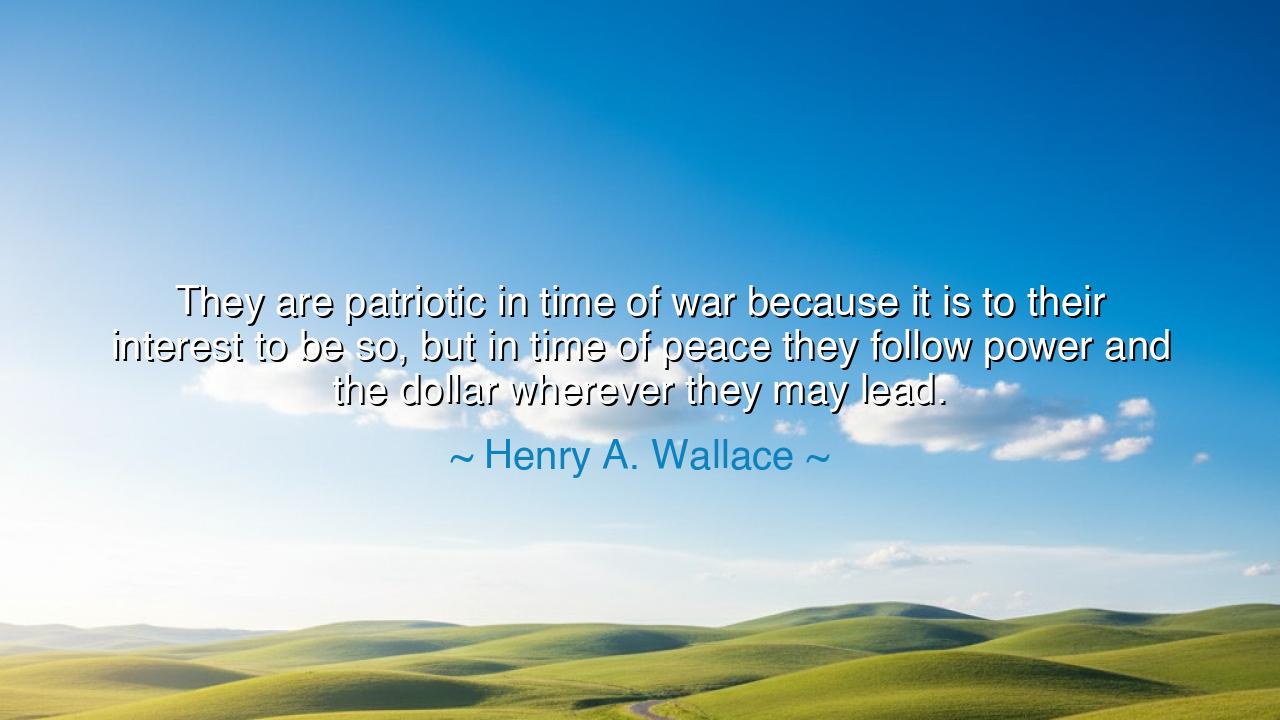
They are patriotic in time of war because it is to their
They are patriotic in time of war because it is to their interest to be so, but in time of peace they follow power and the dollar wherever they may lead.






“They are patriotic in time of war because it is to their interest to be so, but in time of peace they follow power and the dollar wherever they may lead.” Thus spoke Henry A. Wallace, a voice of conscience in a troubled century. His words pierce with both sorrow and accusation, for in them he names a truth that has long haunted nations: that there are those who clothe themselves in patriotism only when it profits them, who wave the flag in battle but abandon its spirit in peace. To Wallace, such loyalty is false, born not of devotion to country but of greed for power and the lure of the dollar.
The meaning of his warning is profound. True patriotism is not seasonal, nor is it convenient. It cannot be donned like a garment in war and cast aside in peace. It is a fire that must burn always, not only when danger threatens. Yet Wallace saw how certain men, whether in government or in business, stirred fervor during conflict, proclaiming loyalty to the nation, only to pursue selfish gain once the guns fell silent. In this hypocrisy, he recognized a great danger—that a people could be deceived into mistaking self-interest for devotion, and thereby lose sight of the higher ideals for which so many had bled.
History confirms his charge. During the First and Second World Wars, countless ordinary citizens gave freely—sons, daughters, lives, and labor—driven by a genuine love of country. But alongside them stood profiteers who wrapped themselves in patriotism while amassing fortunes. Factories boomed with wartime contracts, not out of selfless duty, but for the swelling of coffers. When peace returned, these same voices often grew silent to the cries of veterans, widows, and orphans, following instead the glimmer of profit and the whispers of power.
Even in the ancient world, this pattern held. In Athens, during times of war, men would preach sacrifice for the polis, speaking noble words to rally the people. But when peace returned, many of these same voices bent themselves to the pursuit of wealth, influence, and private gain, forgetting the unity and shared sacrifice that had once preserved the city. Thus Wallace’s words are not only for his age but for all ages, for the weakness of human ambition knows no boundaries of time or place.
The wisdom here is sharp: beware those who speak most loudly of patriotism when it suits their profit. Test their loyalty not in the heat of war, when all are expected to serve, but in the quiet days of peace, when vigilance and service are less glamorous but equally vital. For it is in times of peace that the nation most needs true patriots—those who guard justice, care for the vulnerable, and build a future on foundations of integrity rather than greed.
The lesson for us is this: let your patriotism be steady, not shifting with seasons of profit or peril. Do not be deceived by the empty cries of those who chase dollars under the guise of loyalty. Instead, live your love of country in both war and peace: in honesty, in fairness, in sacrifice, and in service. Ask not only what the land demands in times of danger, but also what it requires in times of calm—education for the young, care for the old, justice for the oppressed, and vigilance against corruption.
Practically, this means choosing integrity over greed in daily life. It means honoring the sacrifices of soldiers not only with parades, but by supporting policies that aid them when they return home. It means resisting leaders who invoke the flag for profit, and standing instead with those who serve quietly for the good of all. Above all, it means remembering that true patriotism is not proven when war drums sound alone, but in the long, steady labor of peace.
So let Wallace’s words be carried forward as a caution: false patriots follow power and the dollar; true patriots follow conscience, justice, and the good of the people. Choose, then, to be among the latter. In war and in peace, let your devotion remain unshaken, that your love of country may never be mere convenience, but an eternal flame.






AAdministratorAdministrator
Welcome, honored guests. Please leave a comment, we will respond soon